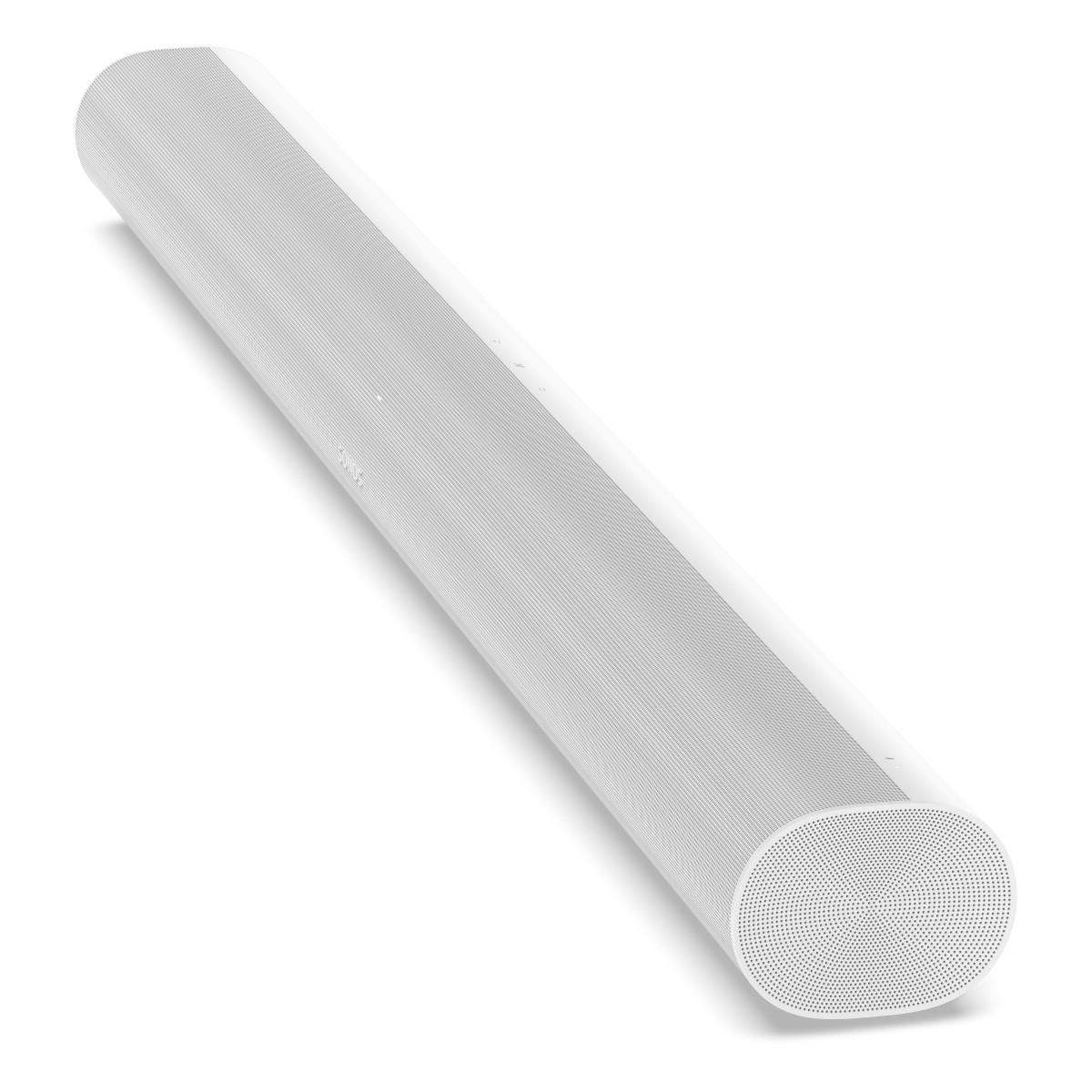
Home theater audio has come a long way from the basic TV speakers of the past. Modern soundbars offer an elegant solution for better audio without the complexity of traditional surround sound systems. Today, we're comparing two distinct approaches: the premium Sonos Arc ($899) and the mid-range Yamaha SR-B30A ($279).
Released in 2020, the Sonos Arc represented a significant leap forward in soundbar technology, introducing upward-firing speakers for Dolby Atmos and smart home integration. The Yamaha SR-B30A, launched in 2023, takes a different approach, focusing on providing solid performance at a more accessible price point with built-in subwoofers.
The Sonos Arc delivers a truly impressive Dolby Atmos experience through its 11-driver array. Dolby Atmos creates three-dimensional sound by adding height channels to traditional surround sound, making helicopters seem to fly overhead or rain appear to fall from above. The Arc's dedicated up-firing speakers bounce sound off your ceiling to create this effect naturally.
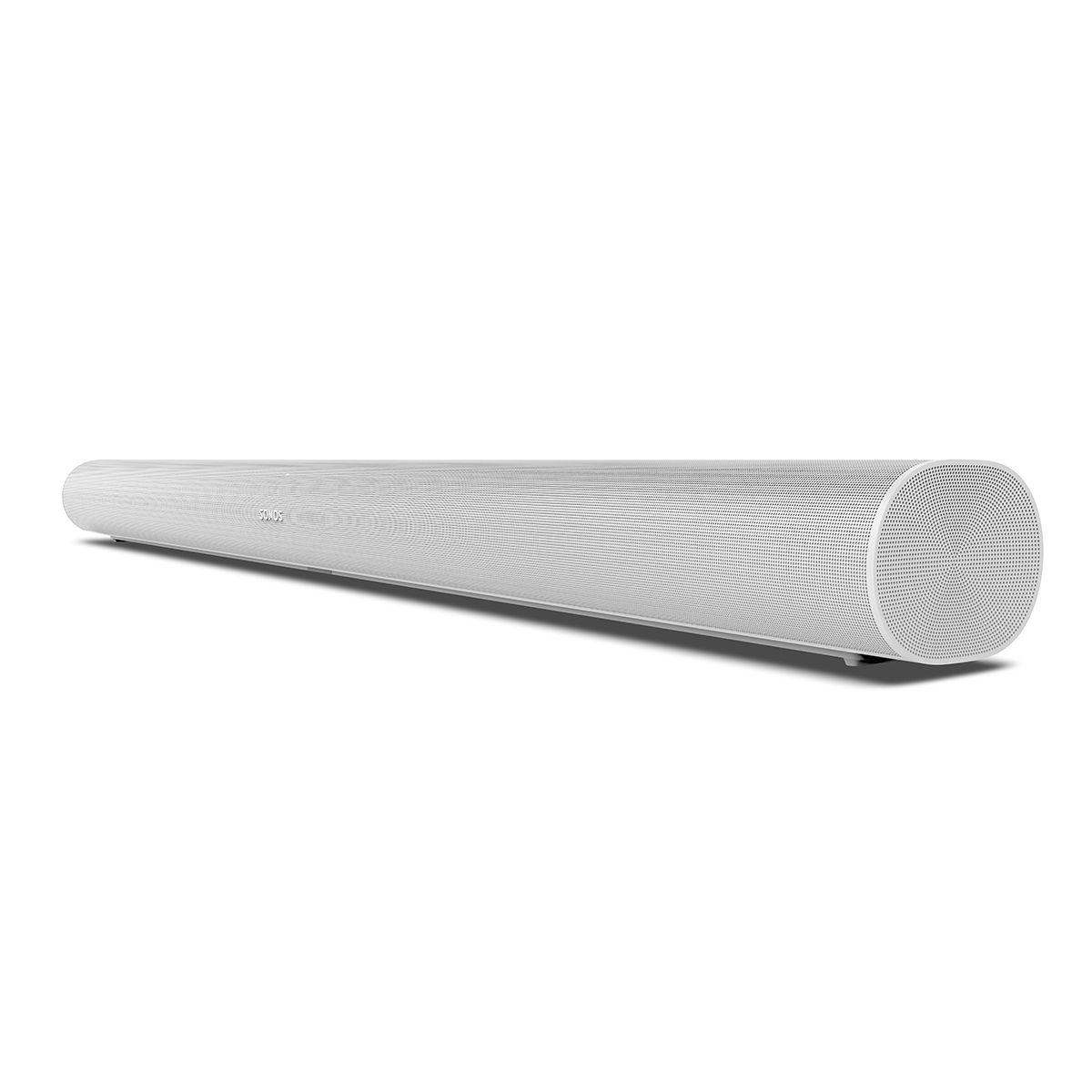
The Yamaha SR-B30A handles Dolby Atmos through virtual processing - meaning it simulates height channels through clever audio processing rather than physical up-firing speakers. While not as convincing as the Arc's approach, it still provides an engaging experience that exceeds standard stereo sound.
Dialog clarity, crucial for enjoying movies and TV shows, is handled differently by each unit. The Arc uses advanced processing and center channel speakers to keep voices clear and natural. The Yamaha employs its "Clear Voice" technology, which effectively boosts dialog frequencies. Both work well, though the Arc's approach sounds more natural in complex scenes.
Music reproduction reveals significant differences between these soundbars. The Arc's sophisticated driver array creates a wider, more detailed soundstage - the perceived space where instruments and voices appear to come from. Its processing maintains clarity even at higher volumes, making it excellent for parties or serious listening sessions.
The Yamaha delivers respectable music performance with good stereo separation and clear highs, though it can't match the Arc's refinement. Its built-in subwoofers provide solid bass response without requiring additional purchases, while the Arc might leave bass-lovers wanting more until they add the optional (and expensive) Sonos Sub.
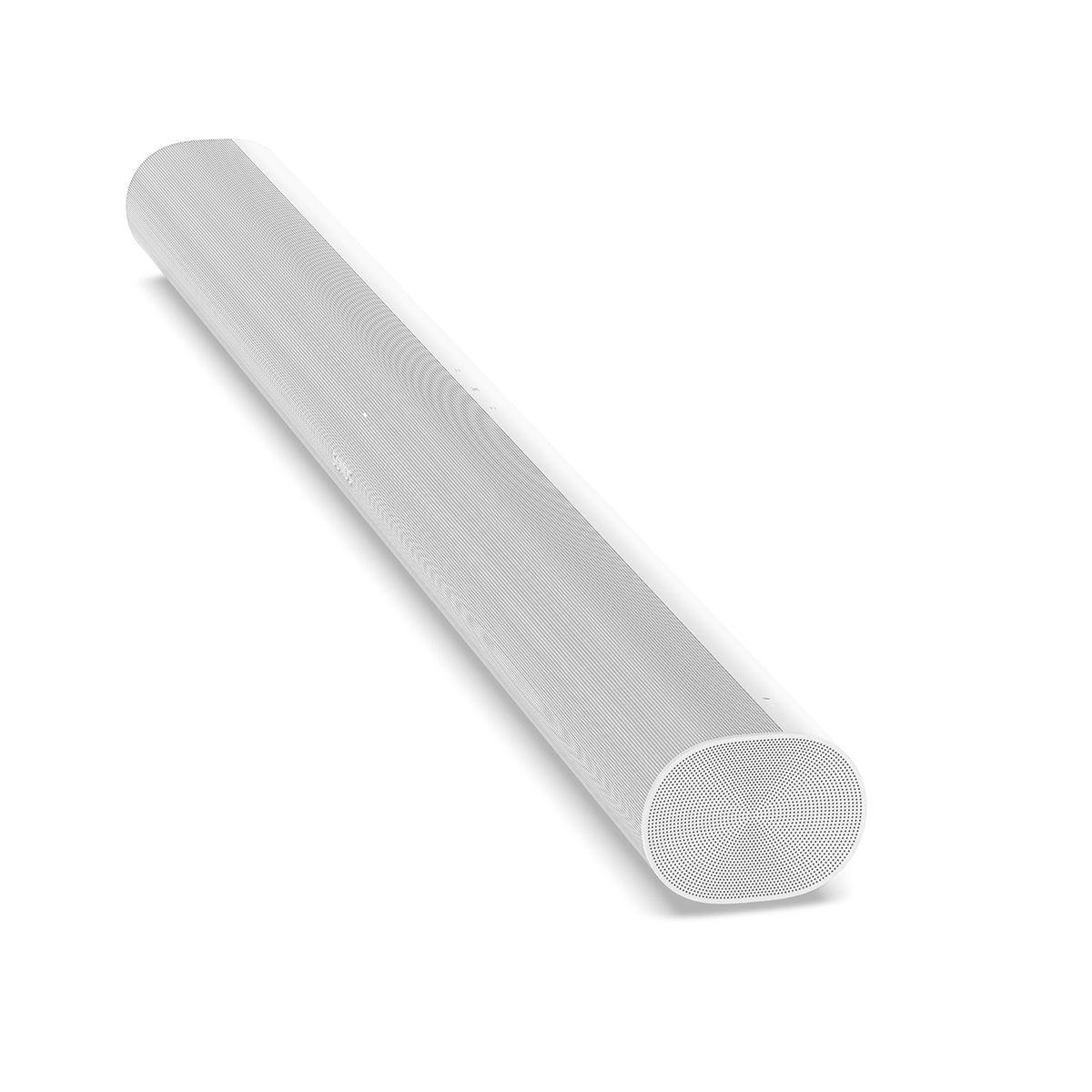
Room size significantly impacts soundbar performance. The Arc's power and driver configuration make it ideal for larger spaces, easily filling rooms over 400 square feet with balanced sound. The Yamaha's more modest output is better suited to small and medium rooms, where it maintains clarity without straining.
The technological gap between these models is most apparent in their smart features. The Arc integrates seamlessly with voice assistants (Google Assistant and Amazon Alexa), supports Apple AirPlay 2, and connects to the sophisticated Sonos ecosystem for multi-room audio. Its app offers extensive customization options and regular software updates add new features over time.
The Yamaha takes a simpler approach with basic Bluetooth streaming and app control. While this means fewer features, it also results in simpler setup and operation - something many users might prefer.
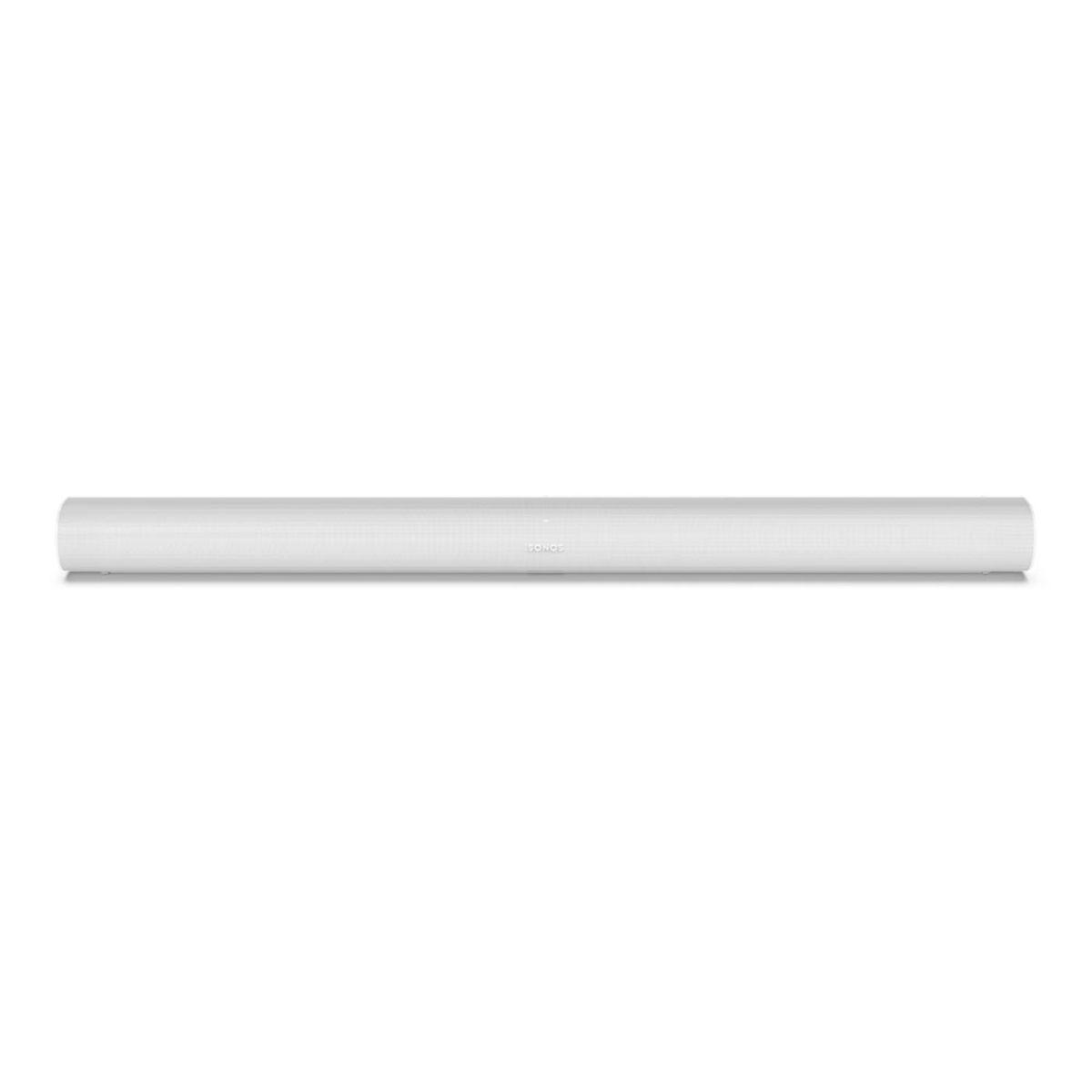
At $899, the Sonos Arc represents a significant investment, but delivers:
The Yamaha SR-B30A at $279 offers:
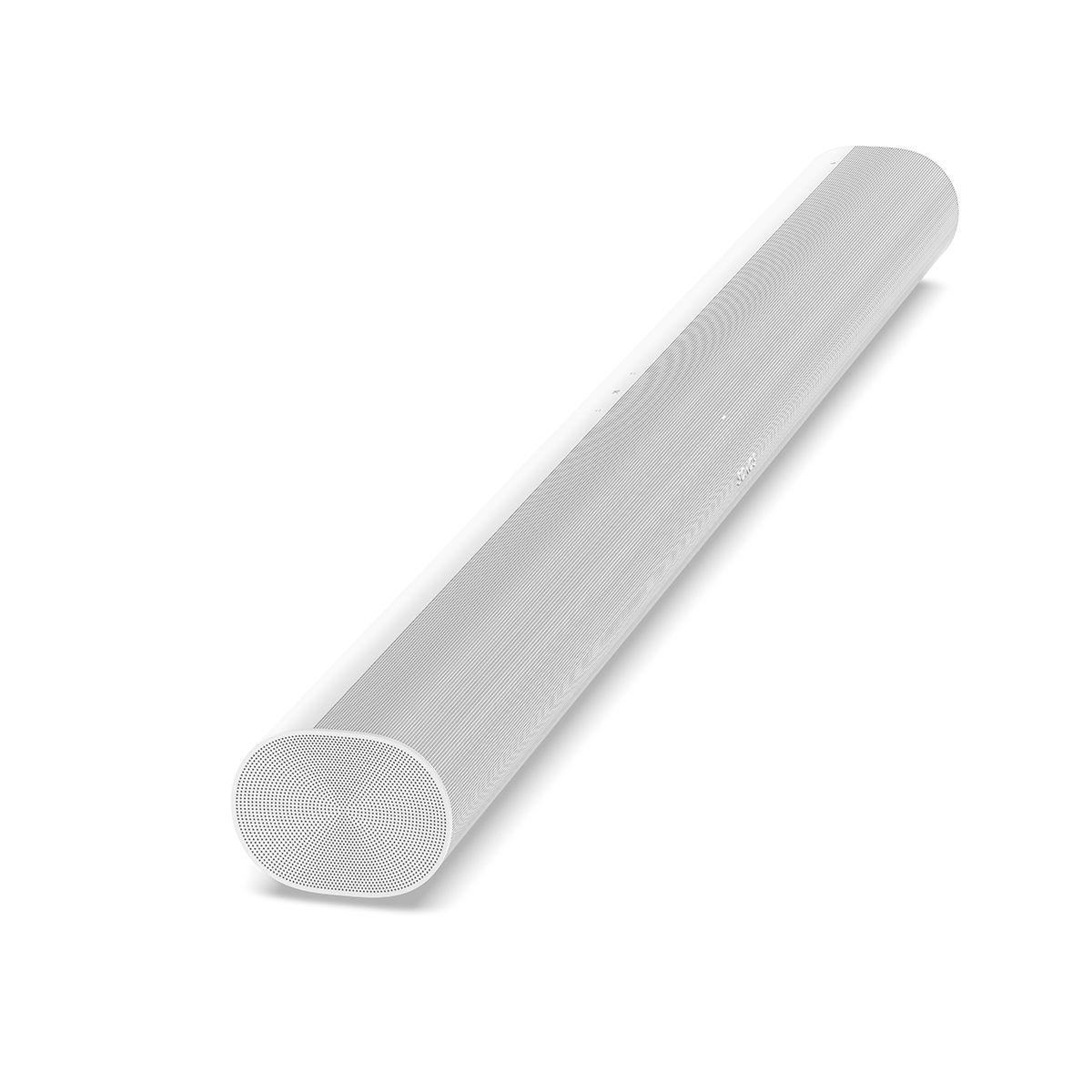
The Arc improved upon its predecessor (the Sonos Playbar) with Dolby Atmos support, HDMI eARC connectivity, and more sophisticated processing. Since its 2020 release, software updates have enhanced its performance and added features like improved bass response and DTS support.
The Yamaha, being newer, benefits from more recent acoustic engineering developments, particularly in virtual surround processing and built-in subwoofer design. It represents the current state of mid-range soundbar technology, delivering features that would have been premium-only just a few years ago.
For home theater enthusiasts, several factors deserve special attention. The Arc's eARC support ensures compatibility with the latest audio formats and its processing power handles complex soundtracks beautifully. The option to add rear speakers and a subwoofer creates a true surround sound system, though at considerable additional cost.
The Yamaha's more basic approach still delivers engaging movie experiences, particularly in smaller rooms. Its built-in subwoofers provide immediate impact without extra components, though they can't match the depth of a dedicated subwoofer.
Consider these key factors when choosing between these soundbars:
The Sonos Arc and Yamaha SR-B30A represent different philosophies in soundbar design. The Arc offers premium performance and features with room to grow, while the Yamaha delivers solid performance in a simpler, more affordable package. Your choice should align with your space, budget, and audio priorities rather than just specs alone.
Remember: great sound doesn't always require the most expensive option, but investing in better audio can significantly enhance your entertainment experience. Choose based on your specific needs and enjoy the dramatic improvement either option will provide over basic TV speakers.
| Sonos Arc | Yamaha SR-B30A |
|---|---|
| Price - Key factor in value proposition | |
| $899 (Premium tier) | $279 (Mid-range tier) |
| Size - Important for TV compatibility and placement | |
| 45" x 4.5" x 3.4" (Better for 55"+ TVs) | 36" x 3" x 5.25" (Ideal for 43-55" TVs) |
| Audio Channels - Determines surround sound capability | |
| 5.0.2 channels with dedicated up-firing speakers | 2.1 channels with virtual surround |
| Drivers - More drivers typically mean better sound separation | |
| 11 drivers (3 tweeters, 8 woofers) | 8 drivers (2 tweeters, 4 woofers, 2 built-in subwoofers) |
| Power Output - Impacts maximum volume and room coverage | |
| Not specified by manufacturer (fills large rooms 400+ sq ft) | 120W total (best for rooms under 400 sq ft) |
| Dolby Atmos Implementation - Affects immersive sound quality | |
| True Dolby Atmos with physical height channels | Virtual Dolby Atmos through processing |
| Voice Assistant Support - Important for smart home integration | |
| Built-in Alexa & Google Assistant | None |
| Connectivity Options - Affects compatibility and streaming | |
| HDMI eARC, WiFi, Ethernet, AirPlay 2, Bluetooth | HDMI eARC, Bluetooth |
| Expandability - Future upgrade potential | |
| Can add wireless sub and rear speakers | No expansion options |
| Room Calibration - Optimizes sound for your space | |
| Trueplay automatic room tuning (iOS only) | Basic EQ adjustments via app |
| Bass Capability - Critical for movie impact | |
| Needs optional sub ($749) for deep bass | Built-in subwoofers provide good bass |
| Smart Features - Convenience and integration | |
| Multi-room audio, streaming services integration, regular updates | Basic Bluetooth streaming, mobile app control |
| Setup Complexity - Impacts initial user experience | |
| More complex setup, requires app and WiFi | Simple plug-and-play setup |
The Sonos Arc provides better movie performance with true Dolby Atmos and dedicated up-firing speakers. While the Yamaha SR-B30A offers good movie sound, the Arc's more sophisticated speaker array creates a more immersive experience.
The Sonos Arc costs $899, while the Yamaha SR-B30A is priced at $279, making it $620 less expensive.
The Yamaha SR-B30A includes built-in subwoofers and doesn't require additional purchases. The Sonos Arc may need the optional Sonos Sub ($749) for optimal bass performance.
The Yamaha SR-B30A is ideal for small to medium rooms under 400 square feet. The Sonos Arc may be overkill for smaller spaces and is better suited to larger rooms.
Both can stream music via Bluetooth, but the Sonos Arc offers additional options like AirPlay 2 and WiFi streaming. The Yamaha SR-B30A is limited to Bluetooth connectivity.
The Yamaha SR-B30A offers simpler plug-and-play setup. The Sonos Arc requires more initial configuration with its app but provides more customization options.
Yes, but differently. The Sonos Arc has physical up-firing speakers for true Dolby Atmos, while the Yamaha SR-B30A uses virtual processing to simulate the effect.
The Sonos Arc has built-in Alexa and Google Assistant support. The Yamaha SR-B30A does not include voice assistant capabilities.
Yes, both the Sonos Arc and Yamaha SR-B30A can be wall-mounted, and both include mounting options in their design.
Both perform well for TV content, but the Sonos Arc offers superior dialogue clarity and sound separation. The Yamaha SR-B30A still provides clear dialogue through its Clear Voice feature.
Both work with modern TVs, but the Sonos Arc performs best with TVs that have HDMI eARC for full Dolby Atmos support. The Yamaha SR-B30A is more flexible with TV compatibility.
The Sonos Arc can be expanded with wireless rear speakers and a subwoofer. The Yamaha SR-B30A is a standalone unit without expansion options.
We've done our best to create useful and informative comparisons to help you decide what product to buy. Our research uses advanced automated methods to create this comparison and perfection is not possible - please contact us for corrections or questions. These are the sites we've researched in the creation of this article: whathifi.com - soundandvision.com - en.community.sonos.com - cnet.com - worldwidestereo.com - abt.com - creativeaudio.net - target.com - sonos.com - worldwidestereo.com - businessinsider.com - en.community.sonos.com - youtube.com - usa.yamaha.com - worldwidestereo.com - audiolab.com - shop.sg.yamaha.com - consumerreports.org - usa.yamaha.com - vinylsound.ca - bestbuy.com - modernappliancewoodward.com - bluestardist.com - target.com - my.yamaha.com